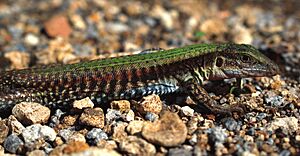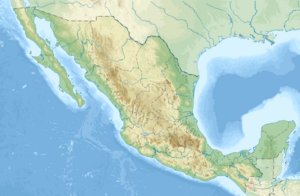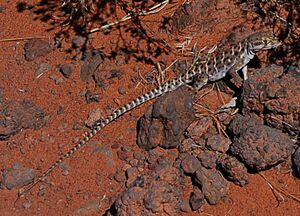Western Mexico whiptail facts for kids
Quick facts for kids Western Mexico whiptail |
|
|---|---|
 |
|
| Conservation status | |
| Scientific classification | |
| Genus: |
Aspidoscelis
|
| Species: |
costatus
|
| Synonyms | |
|
|
The Aspidoscelis costatus, also known as the Western Mexico Whiptail, is a type of lizard that lives only in Mexico. You can find it in places like Guerrero, Morelos, and Puebla, as well as other Mexican states. These lizards live in many different areas, from cool, mild places to warm, tropical ones. They can even be found in busy cities! It's important not to confuse the Western Mexico Whiptail with the Western Whiptail (Aspidoscelis tigris), which is a different lizard.
This small lizard is usually only about 4 inches (10 cm) long from its snout to the start of its tail. It has a pointed snout, a thin body, and long back legs. Its tail is super long and thin, like a whip! If the tail hasn't broken off recently, it can be more than twice the length of its body. So, even though the body is short, the lizard can be almost a foot long when you include its tail. This makes it seem much longer than it is. When these lizards fight over their space or for a mate, they whip their long tails around. That's how they got the name "whiptail." You can often spot them hiding under small desert plants, rocks, or digging through fallen leaves. Whiptails are active during the day but usually like to be alone, except when it's time to find a mate.
Contents
What is a Western Mexico Whiptail?
Western Mexico Whiptails are not like some lizards that just sit and wait for food. Instead, they are very active hunters. They move around a lot, almost constantly, taking quick, jerky steps at a fast pace. Finding food is their main activity all day long. They are often seen poking their snouts under leaves, into cracks, scratching the ground, or digging quickly through piles of dirt and plants. When they move through dry leaves, their stop-and-go movements make a unique crunching sound. If a whiptail lizard needs to escape danger, it can run very fast, up to 18 miles per hour! When they run, their tails stay straight behind them, almost like a galloping crocodile. They race across open areas to find cover in thick bushes.
History of the Name
The name of the Aspidoscelis lizard genus changed in 2002. Before that, this species was part of the Cnemidophorus genus. Scientists like T.W. Reeder suggested the change because they found important differences in how these lizards look and their DNA.
These name changes can sometimes be confusing for scientists. For example, a subspecies called Aspidoscelis costata zweifeli was first named Cnemidophorus sacki zweifeli in 1960. The name "zweifeli" was kept to honor Dr. Richard G. Zweifel, an American scientist who studied reptiles. He helped describe many of the subspecies of what we now call Aspidoscelis costatus.
Physical Description
Western Mexico Whiptails have scaly skin with stripes, bent legs, and a pointed snout. They don't have any spiky crests (like spines) on their backs.
These lizards have many straight stripes on their backs. The stripes can be different colors and patterns on a gray, brown, or black background. They often have pale spots or bar-like patterns mixed in. Their bellies and hip areas are usually cream-colored, but can sometimes be light blue or even red near their hips. Their throats can be pink to red, and these colors can be very bright. The colors and patterns can change based on the individual lizard, its age (young or adult), whether it's male or female, and even the time of year.
Male lizards change their back patterns as they grow. They might start with pale stripes and dark areas, then develop spots or different pale shapes on a black background. Females show similar changes but usually keep their stripes as they get older. The colors on their bellies also change as they grow, with males often becoming more colorful than females.
Western Mexico Whiptails have special eyelids called nictitating membranes, or "third eyelids." This is a clear membrane that slides across their eyeball when they blink, while their top and bottom eyelids stay open. This helps keep their eyes moist, protects them, and lets them see a little bit even while blinking.
Where They Live
Most whiptail lizards like dry places, like deserts. Many kinds of whiptails live in the Sonoran Desert, which stretches across northwestern Mexico and southern California. This area has sparse plants like sagebrush, small desert bushes, grasslands, and pine forests.
The Western Mexico Whiptail also prefers natural areas like savannas and shrublands with broken, brushy land. But they can also live in open parts of tropical forests and thorn forests. They live in both mild and tropical climates in western and southwestern Mexico. Because many of these natural areas have been cleared for farms or towns, you can now find Western Mexico Whiptails living in cities. This is especially true for a subspecies called the Balsas Basin Whiptail.
Some research suggests that global warming might be affecting where Western Mexico Whiptails live. Some groups of these lizards are seeing their living areas shrink, while others are expanding. They might even move to higher elevations to escape warmer temperatures.
How They Live
Western Mexico Whiptails are striped lizards, and they are very active hunters. They move around constantly, unlike lizards with camouflage patterns that stay still. They move many times per minute and spend a lot of time moving.
All whiptail lizards in the Aspidoscelis group are active when their body temperature is between 98.6 and 104 degrees Fahrenheit (37 and 40 degrees Celsius).
Since they need sunlight to warm up their bodies for activity, whiptails adjust their behavior to find warm spots. Larger whiptails spend more time in shaded areas so they don't get too hot. Smaller whiptails can warm up and cool down quickly, so they are more comfortable in open areas, even in summer.
When whiptails need to escape danger, they run very fast, up to 18 miles per hour (29 km/h). They keep their tails straight behind them when they run. They do not whip their tails while running away.
Predators
Snakes and birds that hunt during the day often eat Western Mexico Whiptails and other Aspidoscelis lizards. Because whiptails are always moving around to find food, they might be attacked more often by these daytime predators.
Some animals that eat whiptails include owls, eagles, hawks, coyotes, foxes, bobcats, and almost any snake big enough to swallow them. Even larger lizards, like collared lizards and long-nosed leopard lizards, will eat them.
Many birds of prey eat whiptails. Scientists have found that whiptail lizards are a big part of the diet for roadrunners, which are fast-running birds that mostly stay on the ground.
Whiptail lizards are fast runners and will try to escape predators. If they are in danger, like many lizards, a whiptail might drop part of its tail. This defense strategy is called caudal autotomy. The tail keeps wiggling, which distracts the predator while the lizard runs away. The lizard's tail breaks easily because it has special weak spots. However, it takes a lot of energy for the lizard to grow a new tail.
Whiptails sometimes eat the same insects as other small lizards. But they usually don't compete much for food because whiptails eat insects that are plentiful at certain times of the year, and different lizard species prefer different hunting spots.
Reproduction and Life Cycle
About one-third of whiptail lizards reproduce without a mate, which is called parthenogenesis. This is like cloning themselves. However, the Western Mexico Whiptail is a species that needs both males and females to reproduce. Male Aspidoscelis costatus lizards, like most other lizards, reproduce using a special opening called a cloaca. This opening is located on the underside of the lizard's tail base, just behind its back legs. This is also where digestive waste leaves the body.
Mating Season
Female Western Mexico Whiptails have a clear breeding season, which runs from April (the end of the dry season) through August (the middle of the rainy season). This timing stays the same no matter the climate, whether they live in semi-humid warm areas or cooler, higher places. Reproduction seems to be linked to how long the days are, rather than the temperature.
Aspidoscelis costata lizards have mating cycles where males and females are most active at the same time. However, males become ready to reproduce when they are smaller than females. Males are ready at about 2 inches (5 cm) long, while females are ready at about 2.5 inches (6.3 cm) long.
Male and Female Interactions
During the mating season, male whiptails seem to be ready to mate all the time. A male A. costatus will start to follow a female around and guard her. This behavior is called accompaniment. But only some females will be ready to mate, probably when they are ovulating. Even if a female is ready, she often acts like she's not interested and ignores the male. The male A. costata will stay with his ready mate for only about 9 hours a day, for 2 to 5 days. He stays very close, usually less than 0.5 meters away. Almost all mating happens during this time.
Mate Guarding
Guarding a mate can be tiring for male lizards. They might eat less and become more aggressive. But this behavior continues because the benefits of successfully mating are greater than the energy it costs. While males follow females, they often chase away other males. This increases their aggressive behavior and the risk of getting hurt. Aggressive actions include approaching, lunging, chasing enemies, arching their backs, fighting, and biting. If a male's mate guarding fails, he won't be replaced, but he will face competition from other males. Males eat less during this time, not because they share food with females, but likely to stay close to the female or to show how strong and fit they are. This reduced eating by males was not affected by their body weight, how big the female was, or how many other males they had to fight off. However, following a larger female did lead to more aggression, probably because larger females can lay more eggs.
Laying Eggs
Western Mexico Whiptail lizards are oviparous, meaning they lay eggs that develop and hatch outside the mother's body. Females can lay one to three groups of eggs (called clutches) each year. Each clutch usually has 1 to 5 eggs. The number of eggs in a clutch is usually related to the size of the female. Larger females tend to lay more eggs, and males often compete more intensely for these larger females. In general, Aspidoscelis lizards, especially striped ones like costatus, are active hunters. Because of their hunting style, body shape, and escape methods, these lizards tend to lay a relatively small number of eggs compared to their body size.
Nesting Spots
Female lizards dig holes in the soil, often under rocks, to lay their eggs. These nests are usually about 32 cm long and 14 cm wide. After laying the eggs, the female whiptail does not cover them with soil. This might make it easier for the baby lizards to leave the nest when they hatch. The female lizard then leaves the nest and does not incubate or guard the eggs. There is no further parental care. The eggs are left to incubate in a warm, moist nest with stable temperatures, chosen by the female under rocks.
The eggs usually take 60 to 75 days to hatch. Young lizards typically hatch in July or August.
Relationship with Humans
When people get close and the lizards feel threatened, they will quickly run across the dry ground and disappear behind the nearest small bushes or rocks. They are very fast and hard to catch. If a human holds them, the whiptail might try to bite, but it's usually harmless.
Conservation Status
In 2007, the Aspidoscelis costatus was listed as "Least Concern" by the IUCN. This means they are not currently at high risk of disappearing.
However, some studies suggest that A. costatus has a medium risk of being affected by environmental changes. This is mainly because they live in specific areas, and their habitats are threatened by farming and human settlements. A lot of their natural living space has been cleared or disturbed by human activities.
Subspecies
There are eight recognized subspecies of the Western Mexico Whiptail.
- Aspidoscelis costatus barrancorum (Zweifel, 1959)
- Aspidoscelis costatus costatus (Cope, 1878)
- Aspidoscelis costatus griseocephalus (Zweifel, 1959)
- Aspidoscelis costatus huico (Zweifel, 1959)
- Aspidoscelis costatus mazatlanensis (Zweifel, 1959)
- Aspidoscelis costatus nigrigularis (Zweifel, 1959)
- Aspidoscelis costatus occidentalis (Gadow, 1906)
- Aspidoscelis costatus zweifeli (Duellman, 1960)
If a scientific name has a person's name in parentheses, it means that subspecies was first described under a different genus name than Aspidoscelis.
Name Meaning
The subspecies name, zweifeli, honors an American reptile scientist named Richard G. Zweifel.




